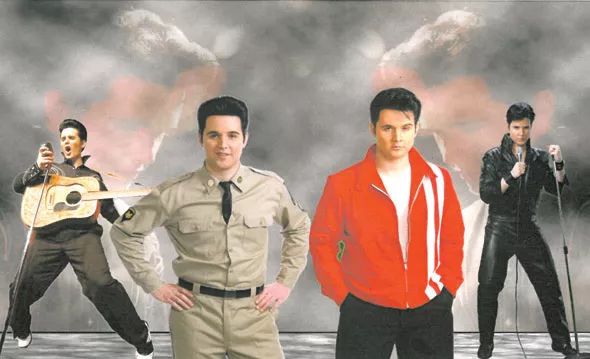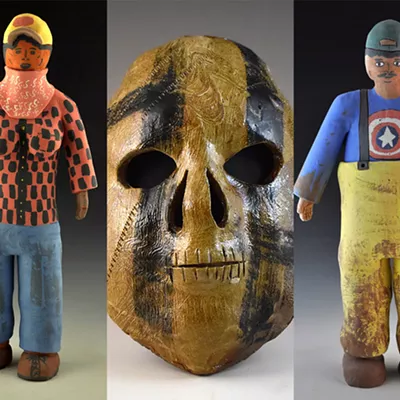Ben Klein had a secret. His parents had no idea what he was doing downstairs. They heard him — watching videos, listening to music — but even today, nine years later, his mother still sounds shocked when she thinks back.
“We had no idea,” Gwen Klein says. “We just thought he was playing his music.”
Her only son had fallen under the spell of another man. And now he wanted to tell his parents.
Klein, then 22, waited until they were sitting down at the Golden Corral on North Division, having just filled their plates at the buffet.
He announced that he wanted to dress up, sing and dance like Elvis Presley.
For months, as his parents went about their day-to-day lives, Klein had been watching Jailhouse Rock and G.I. Blues in their basement, over and over. At first he was just interested, burned out on the stuff on the radio and looking to indulge in some classic music. He turned to his dad’s CD collection and found Elvis.
But then he started mimicking what he saw, not really thinking about it. He tried out Elvis’s signature leg wiggle and the way the man would windmill his left arm as he back-peddled across a stage.
Soon, Klein became entranced by the raw, young Elvis Presley of the mid-1950s — the poor Mississippi boy who sang gospel ballads alongside pop hits and had girls squealing with the mere shake of a knee.
Klein started to memorize everything that made this charismatic performer the King: the way a strand of his black hair curled over his forehead, the way he tucked his acoustic guitar under his right arm to get closer to the mic, the way his voice hiccupped and soared as he sang “Love Me.”
Klein’s parents were shocked.
“Who are you and what have you done with our son? Are you crazy?’” Gwen Klein recalls thinking.
“But he goes, ‘No, you guys don’t know this, but I’ve been working on it … I can do this, and I just really have fallen in love with Elvis Presley,’” she recalls. “He said, ‘I can do this, you guys, but will you help me get started? I can’t do it on my own.’ And we said, ‘Oh my gosh, you’re serious?’”
Klein was serious. He realized he wasn’t just any old converted Elvis fan. He could look and sound and act just like Elvis. And maybe, he hoped, being Elvis would help launch his own music career.
“It was like, ‘Man, maybe I’ve found my niche, you know? Maybe I’ve found something that I can really sink my teeth into,’” he says.
And for almost a decade, that’s what he’s done. A boy who grew up singing with his mom and dad at church, Klein now finds himself dodging underwear onstage as one of the top Elvis tribute acts in the nation.
When he started, he couldn’t have predicted the world of big egos, big money and plastic surgery. Or that his friends would fall away, confused by his interest in Elvis. Or that he’d feel himself growing closer and closer to the King of Rock ’n’ Roll, trading parts of his own identity every time he got onstage.
But, in some ways, Ben Klein was born into this.
Every mother calls her child a miracle, but Gwen Klein really means it.
“I wasn’t supposed to be able to have any children. We were four years into our marriage when we had him. It was a total complete surprise,” she says.
From the beginning, Klein was extremely close with his parents, who were themselves embedded in the Spokane music scene by the time he was born. Gwen performed with the popular local band Daybreak, and Randy Klein made a name for himself as the singer in Randy Klein and Big Brother. At the time Gwen fell in love with her husband, he was known for performing a few songs onstage with his band in a sparkly jumpsuit — singing selections from his favorite artist, Elvis Presley.
The family also sang together on gospel radio and television programs — with Ben Klein first appearing on TV at age 2.
“All of his years growing up, he would be involved in musical programs and concerts,” Gwen Klein says. “The first drums he ever played were my pots and pans on the kitchen floor.”
But when Ben Klein broke his news about Elvis, and asked for his parents’ help in putting on a local variety show, their involvement with the music industry was long past. They had given up rock ’n’ roll for worship hymns nearly 30 years earlier. Randy Klein became a pastor in the early ’90s and ministered at Living Water Christian Fellowship.
“We totally put the secular music world behind us,” Gwen Klein says. “We were led to give it up and put it behind us. And here Ben brought us back into it.”
Locally, the Kleins became known for putting on shows that cast Klein as young Elvis, his dad as old Elvis, and his mother as Patsy Cline.
“I would not even do it if the Lord hadn’t let me know in a certain way that it was OK,” says Randy Klein, who also performs as Johnny Cash. “I believe that things happen for a particular reason, you know?”
When Gwen Klein talks, her tone is devout — religious, almost — as if Elvis Presley, to the Kleins, has become some kind of spiritual figure.
“Never in my wildest imagination would I think that I would come to the day where I married a man who loved Elvis and tributed him and sounded and looked like him in his prime,” she says.
“And then that we’d have a son who looks like Elvis and sings like Elvis...”
Randy Klein has started to think the same way: “When [televangelist] Rex Humbard went to see Elvis before he died, his wife told Elvis … ‘I prayed for you ever since you came out that you would be a bell sheep — the Lord’s bell sheep.’ And Elvis says, ‘What’s that?’ She says, ‘One sheep has a bell around his neck and other people follow it. I have prayed that through your gospel music, and your music, that people would come to the Lord.’”
The Kleins believe Elvis has helped their son spread the good word to others.
“Every day I thank God, Elvis has paved the way and we walk on it,” Gwen Klein says. “To see how [Elvis] was brought up in such a mere, poor situation. And thousands, millions of people have been touched by his music and his life. And look at the way that he has provided for all of these guys — and even some women, believe it or not — to tribute him. He’s made a way, a means, a livelihood for them.”
The signs were there all along, and when Gwen Klein started paying attention, she realized that the connections between their lives and Elvis Presley’s were too numerous to be coincidental. Randy Klein’s mother’s name was Gladys — so was Elvis’s mom’s. One of Elvis’s best friends was named George Klein, which is also Randy’s brother’s name. Elvis Presley Day in Memphis, Tenn., is on Feb. 25, which is Gwen Klein’s birthday. Elvis’s daughter, Lisa-Marie, has a son named Benjamin.
“When you
see all of the likenesses in our lives … you just kind of scratch your
head and go, ‘You know, this is meant to be. This is really meant to
be,’” she says.
Elvis Presley died on the bathroom floor of his Memphis home 35 years ago, but his following gets bigger each year.
Kevin Kern, director of public relations for Elvis Presley Enterprises, says Graceland sees around 600,000 visitors each year. They offer tours in eight languages to accommodate people who come from around the world, which Kern says is interesting considering that Elvis never performed outside of North America.“He was the shot heard ’round the world, in terms of a music revolution,” Kern says. “Elvis is a pop-culture phenomenon. He really started a revolution musically, sexually, culturally.”
Kern says his organization expects 2012, the 35th anniversary of Elvis’s death, to be a huge year for fans. The buzz began in late December, when the five-disc Young Man With the Big Beat: The Complete ’56 Elvis Presley Masters was nominated for a Grammy for best historical album. “He’s an entertainer who continues to have earning power that living celebrities would love to have,” Kern says.
But perhaps the most devoted Elvis fans are the tribute artists — a population often referred to in the plural as “Elvii.” In the book Race and the Subject of Masculinities, Eric Lott contributes a chapter entitled, “All the King’s Men: Elvis Impersonators and White Working-Class Masculinity.” In it, he says there are “heavily-bearded Elvises, four-year-old Elvises, and Elvis duos; Italian Elvises, Greek Elvises, Jewish Elvises, a Lady Elvis, even a Black Elvis.”
Kern says Elvis Presley Enterprises began embracing the impersonation phenomenon six years ago when it started the Ultimate Elvis Tribute Artist contest, bringing in the best Elvis tribute artists — not the most bizarre, but the most accurate — to face off in Memphis.
“We’ve embraced the ETA community and made it a part of Elvis Week, and it’s proven to be popular,” he says. “But we don’t mix the real Elvis with those paying tribute.”
Kern says Ben Klein has become a familiar face to his organization. And while they “try not to play favorites,” he was one of a few tribute artists to represent last year’s competition with the media.
“Both on and off stage, Ben is a great representation of Elvis’s legacy,” he says.
But what also makes Klein unique among tribute artists is his breadth. Though he got his start replicating young Elvis — the black-and-white, fresh-faced “Hound Dog” and “Blue Suede Shoes” days — Klein can now replicate every era of Elvis’s life. On the upcoming 29-city Elvis Lives Tour, he’ll replicate the leather-clad Elvis of the 1968 Comeback Special. And lately, he’s started squeezing himself into a white jumpsuit to tribute the later, crooning, pop years of the older Elvis. That ability to recreate 1956 Elvis and 1975 Elvis side by side is a rarity in the tribute business.
“There’s different songs, there’s different times, there’s even different hairstyles,” Klein says. “There’s all these different aspects.”
Klein also stands out because of his guitar work. Most tribute performers take the strings off their guitars and simply pretend to play, but not Klein.
But perhaps the most unique thing about Klein is that he does not believe he is — or ever will be — Elvis Presley. That, he says, is the key difference between Elvis tribute artists and Elvis impersonators.
“A tribute artist is somebody who goes onstage, does their part and comes offstage and is themself,” he says, sitting outside a north Spokane Starbucks in a red T-shirt, ball cap and sunglasses last August. “Like me right now — I’m not dressed up, I’m not trying to pretend I’m Elvis. There are a lot of guys who go to the hilt.”
Nose jobs, implants and facial reconstruction are realities in the tribute world. Klein says that oftentimes the people who are willing to modify their appearance are the same people who want the screams from fans to continue long after they’ve stepped offstage.
“I don’t try to talk like Elvis offstage. I don’t try to act like Elvis offstage. Because that’s just creepy. It’s just creepy. It’s like it takes method acting to a whole new level of insanity.”
All those stigmas — the freaky fans, the guys onstage living in an imaginary Elvis dream — have made getting into the business difficult for Klein. "Every day I thank God, Elvis has paved the way and we walk on it."
“It took a long time for my friends to actually not only support, but understand,” Klein says. He said most of his friends didn’t realize that the Elvis world was actually a massive business. “It’s not just dress up, it’s not just a Halloween costume.
“I’ve gone through a lot of cynicism and a lot of sarcasticness and just … a lot of people just saying, ‘Why are you doing what you’re doing?’” he says. “They’re like, ‘What’s wrong with you?’ People just don’t understand it. It’s not a normal thing. Let’s face it.”
Today, Klein has gotten used to emphasizing to people — volunteering it, almost — that he’s not Elvis. As he sees it, it’s his job to shake the right leg at the right time, snarl in just the right way and act — onstage, only — the way Elvis did. The tributes and impersonators who get an ego about it get under his skin.
“How can you even become prideful and egotistical in a business when you’re not even yourself? You’re tributing someone else,” he says.
Over the past nine years, there have been plenty of times when he’s wanted to cast Elvis from his life altogether — and just be done with it. Return to his own life, with his wife, his music.
“There’s
a point at which I’m like, ‘Don’t call me Elvis. That’s not my name. My
name’s Ben and I have my own life, and I’m my own person. I’m not
Elvis. And I don’t want to be known as Elvis.’”
When ladies throw their underwear at him, Klein has learned to take the attention — even if it’s creepy attention — gracefully.
“I went out in the audience one time and I had like four women surround me and like rub all over me and stuff. Which was kind of weird. They were a bit on the drunk side,” he says, smiling. “It happens. You know, you’re flattered by it, but at the same time you’re like, ‘Oh, that’s a little strange.’”
There are “sideburn chasers who just want to be with Elvis,” Klein says. “They can’t. They want you to be Elvis so bad because they love Elvis so much.”
He says he’s performed Elvis — from the gold-lamé-jacket years to the sequined-jumpsuit years — “hundreds, maybe a thousand” times in the past nine years.
It’s taken him around the country, paid his bills and had him square off against the best in the business.
Last year, he qualified for the third time to perform at the crme de la crme of tribute competitions: the Ultimate Elvis Tribute Artist Contest in Memphis, put on by Elvis Presley Enterprises itself. Not only does first prize mean you’re the closest thing to Elvis out there, but it carries a purse of $20,000.
Klein took fifth place in the competition in 2007 and fourth in 2008. He took a two-year break — to get married and live his “Ben” life — and returned last year.
At the contest, 26 Elvises are judged on how much they sound like Elvis, how much they look like him, how closely they resemble their given era of Elvis and how easily they generate that presence — that charisma — that the King cultivated.
Last year’s field of tribute artists was stacked.
“You’ve got hundreds of thousands of guys competing in these contests all over the world. You’ve got London, you’ve got Japan, you’ve got 20 contests in the states — all over the place,” he says. “And then when you get there, you’re up against guys who are really good. You’ve got to do well.”
At the 2011 competition, participants submitted a list of the top 20 songs they wanted to sing in order of preference. But since no one finds out their draw until they are backstage, Klein had to haul as many of his 25 Elvis costumes across the country as he could, hoping that he had the right clothes for the songs he’d draw.
His first was the bluesy, vaudevillian “Trouble,” from the 1958 Elvis film King Creole, a song that landed Klein in the top 15.
In the next round — in which performers sang two songs with an intermission to make room for a costume change — he drew two of the best songs from ’50s-era Elvis: the sing-songy 1960 pop hit “G.I. Blues” and 1957’s “Jailhouse Rock.” He slid into the top 10 and then had to sing two songs back-to-back. He drew his favorite Elvis gospel song, “Peace in the Valley,” which Klein sang at his grandfather’s funeral, and a song he’d been performing since the first time he put on blue suede shoes: “Hound Dog.”
His performance put him in the top five.
His next draw, “Baby, Let’s Play House,” is a dark and raucous 1955 rocker with the famous line, “I’d rather see you dead, little girl, than to be with another man.” Klein did it well, but in the end, a young, talented Arkansan named Cody Slaughter edged him out for first.
An Aug. 12 Memphis Flyer blog pointed out that judges were looking beyond jumpsuit-era Elvis: “[Slaughter] defeated nine other finalists at the Orpheum Friday night — eight of them wearing white jumpsuits. … The runner-up, Ben Klein, wore a gold jacket and also had some nice moves, but his comedy routine went on too long and fell flat.”
Klein took second place — an honor, but one that pays $17,000 less than first prize.
“Second place is… it’s better than 10th,” he says. “It’s not first, but top three is huge.”
Today, he says he’s glad he didn’t win. When you win, there’s no going back.
“You don’t compete after that ever again. You just don’t,” Klein says. “You don’t go backwards from this contest, you go forwards from it.”
The winner, Cody Slaughter, was cast as Elvis in the touring Broadway musical Million Dollar Quartet.
Klein says he’s not sure if he’ll compete in the 2012 competition.
He feels like he knows Elvis now. He quickly defends him — a man who died before he was born — saying that he’s sure that Presley never did illegal drugs. He says, with certainty, that Elvis was a good man who never took himself too seriously. And when people talk about “fat Elvis,” it offends him.
“That’s really disrespectful,’” he says. “It’s kind of disgusting, to be honest.”
But even Klein can admit that he would never want Elvis’s decadent, lonely life.
“Not that he had a bad lifestyle, but he was pretty much a shut-in for a lot of his life,” he says. “He paid these people to be around him. And I don’t know if he ever really felt like they were truly his friends or if they were just there because there was a paycheck.”
Elvis couldn’t maintain his own lifestyle. And so following a sustainable path, Klein says, is important to him. He has to eat well, exercise — take care of himself.
“All these things are part of the epiphany that you have when you get into this business — you realize that your time is limited,” he says. “There’s only so long you can do [it].”
But even if Klein moves on and becomes an original musician — and drops the Elvis gig altogether — he says it feels like Elvis Presley has become a part of him.
“You know how … when you’re married to someone for a long time, you take on traits of them?” he says. “Even sometimes you start to look like a person.
“Well, that’s how I feel like with Elvis.”
Elvis Birthday Bash and Send-Off Party for Ben Klein • Sun, Jan. 8, from 7-10 pm • Ichiban Sushi Lounge • 202 W. Third Ave. • $5 • All-ages • Reservations recommended • benpresleeklein.com • 747-8877




















